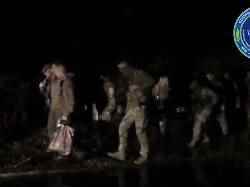Moscow releases Azov soldiers
A Putin friend for over 100 “neo-Nazis”
By Denis Trubetskoy
09/22/2022, 3:21 p.m
Russia releases 215 prisoners of war, Ukraine sends 55 Russian soldiers back to Russia – and a Ukrainian oligarch. “How are you supposed to explain that to anyone?” asks a Russian war correspondent.
The partial mobilization announced by Russian President Vladimir Putin on Wednesday morning brought joy to Russian war propagandists, who have long been calling for tougher action in the war of aggression against Ukraine. In the late evening, however, a great disappointment awaited them. Because Russia and Ukraine have carried out their most important prisoner exchange to date. It’s not just about pure numbers, but above all about figures that have been exchanged by both sides.
As part of the exchange, Ukraine was able to free a total of 215 people. Behind this number are not only foreign soldiers, some of whom were sentenced to death by the so-called Donetsk People’s Republic, but also 108 soldiers from the Azov regiment and five commanders who took part in the defense of the Azov steel plant in Mariupol, including Denys Prokopenko and Sviatoslav Palamar of the Azov regiment and Serhiy Volynskyy of the 36th Marine Brigade, who have always been stylized by Russian propaganda as the faces of Ukraine’s alleged “neo-Nazis”.
Putin friend was also exchanged
Unlike the other Azov soldiers, however, Prokopenko, Palamar and Volynskyj were not allowed to return to Ukraine until the end of the war. As part of the so-called extraction procedure, they will remain in Turkey for the time being and, according to Ukrainian President Volodymyr Zelenskyy, will be “in the complete safety and under the personal protection of the President of Turkey”. “We fought the longest and hardest for these people,” emphasized Zelenskyj.
The Russians, on the other hand, only got 55 soldiers back, but the prisoner exchange also includes Ukrainian businessman and politician Viktor Medvedchuk, who stood behind the pro-Russian opposition platform party and was accused of high treason in Ukraine. Medvedchuk maintains a close relationship with Russian President Vladimir Putin, as well as with the current Deputy Head of the Russian Security Council, Dmitry Medvedev.
According to media reports, Putin is the godfather of Medvedchuk’s daughter. At the beginning of the war, Medvedchuk was able to escape from house arrest under unclear circumstances, but he was arrested in April. Since then there has been speculation about a possible replacement. Moscow officials such as Kremlin spokesman Dmitry Peskov had actually ruled this out because Medvedchuk is not a member of the army and is also a Ukrainian citizen.
Ironically, the “Nazi battalions”
When the Ukrainian defenders of the Azov Steel Plant, which included soldiers from the Azov Regiment, which is part of the Ukrainian National Guard, surrendered in May, the Ukrainian authorities promised to replace them, but asked for discretion not to disrupt the negotiations. Russia, on the other hand, threatened a war tribunal and even made preparations for a show trial in Mariupol. Moscow said that an exchange could only be discussed after a verdict, and that leaders were out of the question.
While this isn’t the first prisoner exchange in which Azov soldiers have been released, so far it has involved the seriously injured, which has already caused displeasure among Russian nationalists.
The majority of the Azovstal defenders will probably remain in captivity. However, with Prokopenko, Palamar and Volynskyj, all the most famous faces are free. This is a hard blow to Russian propaganda, as the Azov regiment was at the center of the narrative of “Ukrainian Nazi battalions” against which Russia was fighting. As a volunteer battalion, Azov emerged at the beginning of the Donbass war in 2014 from questionable right-wing extremist structures. Meanwhile, the regiment has evolved into a special unit of the Ukrainian National Guard and enjoys hero status in the country after defending Mariupol. The Ukrainian network reacted all the more euphorically to the unexpected news late in the evening.
The timing was probably chosen deliberately
On the Russian Internet, on the other hand, people were more in shock. “How to explain that to anyone?” Russian state television war correspondent Andrei Rudenko wrote on his Telegram channel. “It feels like a dick in the face.” Presumably, the lack of understanding, especially after the successful counter-offensive by the Ukrainians in the Kharkiv district, would have been somewhat less if only Russian military personnel had been involved in the exchange. But Medvedchuk’s personality raises big questions, because he is considered a failed politician who was well funded by Moscow but could not produce any results.
Maybe that explains the timing of the exchange. Mykhailo Podoliak, an adviser in Zelenskyi’s presidential office, said Russia may not have randomly scheduled the prisoner exchange on the day of mobilization so that the exchange would be a bit lost in the media. Russia also seems to want to shift the responsibility for this towards the head of the so-called Donetsk People’s Republic, Denis Puschilin. According to his own statements, he signed the decree on the exchange – and is now trying to explain the exchange of Medvedchuk. “Before my eyes, thousands of our boys were released with the participation of Medvedchuk,” said Pushilin, referring to earlier prisoner exchanges during the Donbass war. It is questionable whether that is enough for the patriotic public in Russia.
